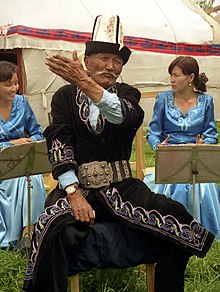
Back تراث شفهي Arabic মৌখিক পৰম্পৰা AS Şifahi ənənə AZ মৌখিক প্রথা Bengali/Bangla Transmissió oral Catalan Lidová slovesnost Czech Traddodiad llafar CY Mundtlig overlevering Danish Mündliche Überlieferung German Parola tradicio EO

Oral tradition, or oral lore, is a form of human communication in which knowledge, art, ideas and culture are received, preserved, and transmitted orally from one generation to another.[1][2][3] The transmission is through speech or song and may include folktales, ballads, chants, prose or poetry. The information is mentally recorded by oral repositories, sometimes termed "walking libraries", who are usually also performers.[4][5] Oral tradition is a medium of communication for a society to transmit oral history, oral literature, oral law and other knowledge across generations without a writing system, or in parallel to a writing system. It is the most widespread medium of human communication.[6] They often remain in use in the modern era throughout for cultural preservation.
Religions such as Buddhism, Hinduism, Catholicism,[7] and Jainism have used oral tradition, in parallel to writing, to transmit their canonical scriptures, rituals, hymns and mythologies.[8][9][10] African societies have broadly been labelled oral civilisations, contrasted with literate civilisations, due to their reverence for the oral word and widespread use of oral tradition.[a][12][13]
Oral tradition is memories, knowledge, and expression held in common by a group over many generations: it is the long preservation of immediate or contemporaneous testimony.[1][14] It may be defined as the recall and transmission of specific, preserved textual and cultural knowledge through vocal utterance.[2][15] Oral tradition is usually popular, and can be exoteric or esoteric. It speaks to people according to their understanding, unveiling itself in accordance with their aptitudes.[16]: 168
As an academic discipline, oral tradition refers both to objects and methods of study.[17] It is distinct from oral history,[14] which is the recording of personal testimony of those who experienced historical eras or events.[18] Oral tradition is also distinct from the study of orality, defined as thought and its verbal expression in societies where the technologies of literacy (writing and print) are unfamiliar.[19] Folklore is one albeit not the only type of oral tradition.[20][21]
- ^ a b Vansina, Jan: Oral Tradition as History (1985), reported statements from present generation which "specifies that the message must be oral statements spoken, sung or called out on musical instruments only"; "There must be transmission by word of mouth over at least a generation". He points out, "Our definition is a working definition for the use of historians. Sociologists, linguists or scholars of the verbal arts propose their own, which in, e.g., sociology, stresses common knowledge. In linguistics, features that distinguish the language from common dialogue (linguists), and in the verbal arts features of form and content that define art (folklorists)."
- ^ a b Oral Tradition Archived 2016-08-09 at the Wayback Machine, Encyclopædia Britannica, John Miles Foley
- ^ Ki-Zerbo, Joseph: "Methodology and African Prehistory", 1990, UNESCO International Scientific Committee for the Drafting of a General History of Africa; James Currey Publishers, ISBN 0-85255-091-X, 9780852550915; see Ch. 7; "Oral tradition and its methodology" at pages 54–61; at page 54: "Oral tradition may be defined as being a testimony transmitted verbally from one generation to another. Its special characteristics are that it is verbal and the manner in which it is transmitted."
- ^ John, Magnus (1979). "Libraries in oral-traditional societies". International Library Review. 11 (3): 321–339. doi:10.1016/0020-7837(79)90003-7. ISSN 0020-7837.
- ^ Chisita, Collence; Abdullahi, Ismaili (2010). The Challenges and Opportunities of preparing LIS Students for Orally based communities. World Library and Information Congress: 76th Ifla General Conference and Assembly – via Academia.edu.
- ^ "Oral tradition". Britannica. Retrieved 23 August 2024.
- ^ "Catechism of the Catholic Church – The Transmission of Divine Revelation". vatican.va. Archived from the original on 27 October 2014. Retrieved 15 January 2020.
- ^ Jack Goody (1987). The Interface Between the Written and the Oral. Cambridge University Press. pp. 110–121. ISBN 978-0-521-33794-6.
- ^ Cite error: The named reference
witzel68was invoked but never defined (see the help page). - ^ Donald S. Lopez Jr. (1995). "Authority and Orality in the Mahāyāna" (PDF). Numen. 42 (1). Brill Academic: 21–47. doi:10.1163/1568527952598800. hdl:2027.42/43799. JSTOR 3270278. Archived (PDF) from the original on 1 January 2011. Retrieved 23 September 2019.
- ^ Mouralis, Bernard (2022). "Orality". Encyclopedia of African Religions and Philosophy. Springer. pp. 537–539. doi:10.1007/978-94-024-2068-5_296. ISBN 978-94-024-2066-1.
- ^ Vansina, Jan (1971). "Once upon a Time: Oral Traditions as History in Africa". Daedalus. 100 (2). MIT Press: 442–468. JSTOR 20024011.
- ^ Hama, Boubou; Ki-Zerbo, Joseph (1981). "The place of history in African society". General History of Africa: Volume 1. UNESCO Publishing.
- ^ a b Henige, David (1988). "Oral, but Oral What? : The Nomenclatures of Orality and Their Implications". Oral Tradition. 3 (1–2): 229–238. hdl:10355/64090.
- ^ Cite error: The named reference
MacKay1999p1was invoked but never defined (see the help page). - ^ Bâ, Amadou (1981). "The living tradition". General History of Africa: Volume 1. UNESCO Publishing.
- ^ Dundes, Alan, "Editor's Introduction" to The Theory of Oral Composition, John Miles Foley. Bloomington, IUP, 1988, pp. ix–xii
- ^ "Oral History". Archived from the original on 20 August 2011.
- ^ Ong, Walter, S.J., Orality and Literacy: The Technologizing of the Word. London: Methuen, 1982, p. 12.
- ^ Degh, Linda. American Folklore and the Mass Media. Bloomington: IUP, 1994, p. 31
- ^ Folklore in the Oral Tradition, Fairytales, Fables and Folk-legend Archived 2016-07-19 at the Wayback Machine, Julie Carthy (1984), The Oral Tradition, Volume IV, Yale University, Quote: "Folklore is said to be in the oral tradition. Dundes states that the most common criterion for a definition of folklore is its means of transmission that is, orally. He clarifies however that materials other than folklore are also orally conveyed. Therefore oral transmission itself is not sufficient to distinguish folklore from non-folklore."
Cite error: There are <ref group=lower-alpha> tags or {{efn}} templates on this page, but the references will not show without a {{reflist|group=lower-alpha}} template or {{notelist}} template (see the help page).